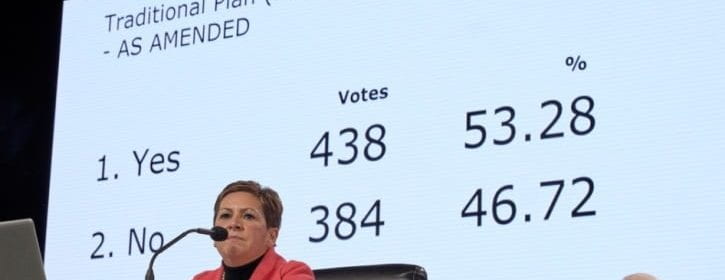Womanist Spirituality and Consciousness Provides Endurance for Injustice

Womanist spirituality and conscientiousness provide perseverance to marginalized individuals embittered by incessant oppression. For example, queer advocates have fought for same-sex marriage and the ordination of queer individuals since the statement, “[t]he United Methodist Church does not condone the practice of homosexuality and considers this practice incompatible with Christian teaching,” entered the governing book of the UMC (the Book of Discipline [1]) in 1972.[2] After the 2019 Special Session of the General Conference strengthened their ban on queer clergy ordination and same-sex marriage by adopting the Traditional Plan, queer individuals around the world are embittered by the continued lack of queer equality within the United Methodist Church. How can the marginalized queer community continue to endure such oppression without becoming bitter in the process? The womanist theologian, Paula Lightsey, tackles this question in her book, Our Lives Matter. She declares womanist spirituality and conscientiousness of injustice help the oppressed resist embitterment by providing tools for endurance.[3] This essay will discuss how both womanist spirituality and conscientiousness of injustice empowers the marginalized to transcend oppression and resist embitterment.
First, womanist spirituality helps the marginalized resist embitterment by providing hope and transcendence beyond oppression. Lightsey uses the doctrine of creation to both explain the source of oppression and hope that can arise in the midst of that oppression.[4] She states:
“[a] hubristic understanding of the world as the work of human hands rather than of God’s good Creation is the origination of the first level of oppression, the foundation to all the interlocking oppressions. On this path, humanity substitutes a theological perspective of themselves as caretakers of the world with the belief that they are the owners and sustainers of the world.”[5]
In contrast to the oppressive ideology of hubris, womanist spirituality does not deny the authority of God in the world.[6] Womanist spirituality is the “deep kneading of humanity into one breath, one hope, one vision”.[7] Lightsey declares, “[w]omanist spirituality as ‘our way of living’ and a ‘style of witness’ is precisely those ingredients that have helped many Black women transcend the works of oppression, particularly dehumanization and discrimination.”[8]It is a type of witness and embodiment that transforms prejudice, oppression, and hatred into the rich love of God through Jesus.[9] Therefore, womanist spirituality empowers the marginalized by instilling them with a unified hope for the goodness of humanity and God’s love that transcends oppression.
Second, conscientiousness of injustice helps the oppressed to avoid bitterness by helping them express anger in a constructive way. Lightsey asserts that the marginalized must acknowledge their anger and move their anger into action.[10] She writes:
“It is imperative that our consciousness, how we understand ourselves as a community, not function as some intractable religious foundation whereby we are doomed always to act as prostrating subjects of oppression suffering from insurmountable persecution.”[11]
Lightsey also states that unexpressed anger can perpetuate bitterness of the soul as its limits become explosive.[12] She calls for the marginalized to cease dismissing their anger, as such dismissal becomes a “tacit acceptance of our supposed lot in life.”[13] Acceptance of subordinance leads to bitterness of the soul. The oppressed should instead acknowledge their anger, and channel it to an action to eradicate discrimination.[14] Hence, conscientiousness of injustice helps the marginalized avoid bitterness by channeling their anger towards subverting oppression.
In conclusion, both womanist spirituality and conscientiousness of injustice help to provide tools of perseverance for transcending oppression and resisting embitterment. As queer communities around the world mourn the decision of the 2019 General Conference maintaining their stance on human sexuality, it is important to manage bitterness in order to transcend oppression. Lightsey states:
“The capacity to see the ‘social forces and structures,’ as Murray put it, that are at work can only be gained by critical analysis and divorcing ourselves from the temptation to allow our emotions rather than our hearts and minds together to lead the way.”[15]
Womanist spirituality provides the hope for a better future while conscientiousness of injustice helps to channel embittered anger to constructive actions of subversion. Together, womanist spirituality and conscientiousness provide tools for the marginalized to fight against oppression.
[1]United Methodist Communications, “Glossary: Book of Discipline, The,” The United Methodist Church, May 17, 2015, accessed February 26, 2019, http://www.umc.org/what-we-believe/glossary-book-of-discipline-the.
[2]Kathy L. Gilbert, “GC2016 Tackling 44-year Stance on Homosexuality,” UM News, April 28, 2016, accessed February 26, 2019, https://www.umnews.org/en/news/gc2016-tackling-44-year-stance-on-homosexuality.
[3]Pamela R. Lightsey, Our Lives Matter: A Womanist Queer Theology (Eugene, OR: Pickwick Publications, 2015),
62.
[4]Lightsey, 60.
[5]Lightsey, 59.
[6]Lightsey, 64.
[7]Lightsey, 63.
[8]Lightsey, 63-64.
[9]Lightsey, 63.
[10]Lightsey, 66.
[11]Lightsey, 62.
[12]Lightsey, 61.
[13]Lightsey, 59.
[14]Lightsey, 59.
[15]Lightsey, 62.